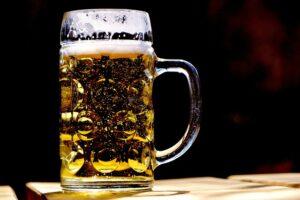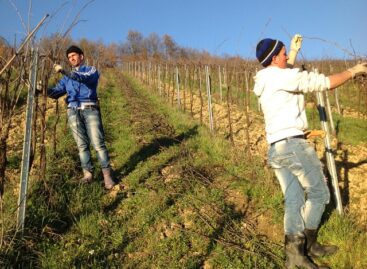A Hungarian organic beer product line was developed from alternative cereals
Elixbeer Konzorcium, led by Körös-Maros Biofarm Kft., developed a Hungarian biobeer product line from alternative cereals using almost HUF 400 million in EU funding, said Zoltán Várhelyi, Kft. project manager of MTI.

(Photo: Pixabay)
The Institute of Agriculture of the Agricultural Research Center and Gabonakutató NKft in Szeged participated in the consortium. also, the total cost of the development was HUF 496.5 million. The goal was to develop organic certified beers and malt beverages with improved content values using domestically bred grain varieties. For this, the two research institutes carried out grain breeding, focusing on the usability of the beer industry, and optimized the cultivation technology of the bred grain on the arable land of the Biofarm, on about one hundred hectares, the specialist said. The Department of Bioengineering and Fermentation Technology of the Hungarian University of Agriculture and Life Sciences (MATE) was also involved in the project, where they developed recipes for prototypes of new organic beers, based on which trial productions were carried out at Biofarm’s brewery in Gyulavár. After that, the content values of the finished products were examined in the MATE laboratory, about which numerous scientific publications were published, he added. Zoltán Várhelyi said that as a result of the project, several cultivated grain varieties received state recognition, and a product range consisting of 9 types of beer and non-alcoholic malt beverages, all in organic quality, was completed.
The beers are based on malts made from organic barley, wheat and alternative grains
In addition to the organic lager “base beer”, there is also a buckwheat beer made from purely gluten-free ingredients, an alcohol-free and fruit-flavored beer with a high antioxidant content. In order to support the quality of the products, the online organic lot certification system was developed, so the entire product path from the farm to the table can be easily tracked, he noted. Zoltán Várhelyi told MTI that organic grains can be grown with a lower yield, typically the average yield is 2-3 tons per hectare; of this, around 200,000 0.33 liter bottles of beer were produced in the peak year. Less beer is currently being produced due to the drought, increased energy costs, and sales outlets forced to close due to the coronavirus epidemic.
Körös-Maros Biofarm is one of the largest organic milk farms in Hungary, founded as a family business in 1990
They farm on about 1,070 hectares of integrated eco-area, and keep 700 dairy cows and 800 students on their cattle farm. They produce 5.5 million liters of organic milk per year, most of which is processed by Vác Naszálytej Zrt. They also sell raw organic milk to partner companies in Italy, Austria, Germany, Romania and Croatia. In addition to animal husbandry, they also grow organic grain.
The first biogas plant in Békés County was established in 2010
Biogas with a methane content of around 52-54 percent is produced from cattle manure and green waste, from which electricity is produced. A smaller part of this is used to supply energy to the cattle farm and the biogas plant, and the larger part is sold as “green electricity”. The sales revenue in 2022 was around HUF 1.4 billion, of which beer sales account for only about two percent, said Zoltán Várhelyi. A larger part comes from milk production, and a part from the electricity produced in the biogas plant. According to publicly available company data, the net revenue from sales in 2021 was HUF 925 million compared to HUF 803 million the previous year, of which domestic sales accounted for HUF 671 million and export sales for HUF 254 million. The after-tax profit of the company, which employs around 60 employees, was HUF 28.7 million in 2021, which is HUF 10 million less than the previous year.
MTI
Related news
The price of growth – the well-working Coop approach: An interview with Dr István Rédei, president-CEO of COOP Star Zrt.
🎧 Hallgasd a cikket: Lejátszás Szünet Folytatás Leállítás Nyelv: Auto…
Read more >Tokaj-Hegyalja University is already the second most popular viticulture and winemaking training institution in the country
🎧 Hallgasd a cikket: Lejátszás Szünet Folytatás Leállítás Nyelv: Auto…
Read more >Balázs Hankó: MATE is already among the world’s top 100 agricultural universities
🎧 Hallgasd a cikket: Lejátszás Szünet Folytatás Leállítás Nyelv: Auto…
Read more >Related news
How Coca-Cola plans to build more billion-dollar brands
🎧 Hallgasd a cikket: Lejátszás Szünet Folytatás Leállítás Nyelv: Auto…
Read more >








